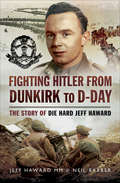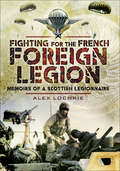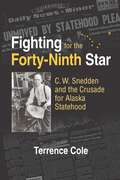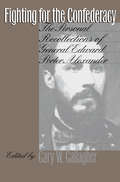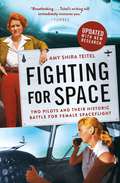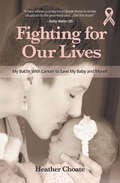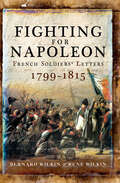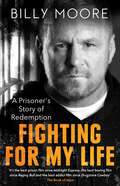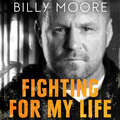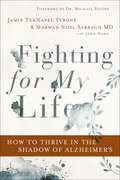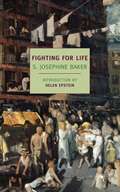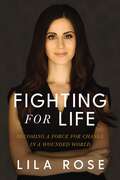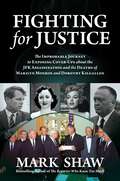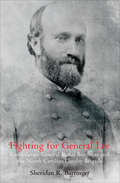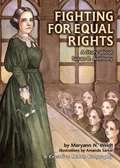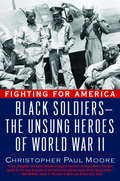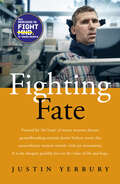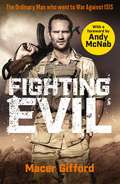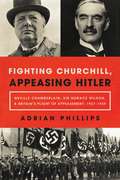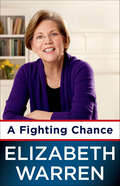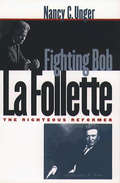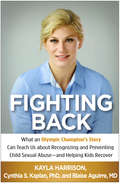- Table View
- List View
Fighting Hitler from Dunkirk to D-Day: The Story of Die Hard Jeff Haward
by Jeff Haward Neil BarberFighting Hitler From Dunkirk to D-Day is the compelling story of a man belonging to a group of which there are now very few survivors. Jeff Haward MM is a pre-war Territorial Army soldier who enlisted merely for something to do in the evenings. Consequently, he fought throughout the entirety of the Second World War. Jeff is a 'Die Hard', the historic name given to men of the famous Middlesex Regiment. He joined the 1/7th Battalion, a machine-gun battalion, equipped with the British Army's iconic Vickers medium machine gun.Following evacuation from Dunkirk, the 1/7th, while refitting and re-equipping, carried out coastal defence duties in preparation for the German invasion. So desperate was the situation that on sentry duty, the one rifle per section had to be handed to the next sentry, along with the only ammunition available three rounds!In 1941, they were attached to the famous 51st Highland Division. The less than enthusiastic welcome from the Jocks gradually evolved into respect following the Middlesex's performance at El Alamein and the subsequent campaigns in North Africa, Sicily, Normandy and North West Europe.Following the Reichswald battle, in March 1945, Jeff was surprised to hear that he had been awarded the Military Medal for bravery and was subsequently awarded the ribbon by none other than Field Marshal Sir Bernard Montgomery.Jeff Haward's experiences, those of a normal soldier, make fascinating reading and throw new light on the use of such Vickers gun battalions during the war.
Fighting for the French Foreign Legion: Memoirs of a Scottish Legionnaire
by Alex LochrieA soldier’s true story of danger and adventure as a modern-day legionnaire in Kuwait, Bosnia, and beyond. With no French language ability, Alex Lochrie approached recruiters for the French Foreign Legion in Paris and embarked on the demanding selection process that followed. When he was accepted, he and other prospective legionnaires were sent to Southern France to begin the harsh recruit training course. The mix of nationalities and backgrounds among his fellows was enormous. New members are traditionally allowed to change their identities—and Lochrie chose to alter his age, becoming twenty-eight instead of thirty-eight. Elite paratrooper training followed in Corsica before Lochrie earned his wings. The FFL is never far from the front line, and in this book he tells of challenging active service in former French colonies in Africa as well as during the first Gulf War, evicting Saddam Hussein from Kuwait, and operations in Bosnia and Sarajevo. This gripping account lifts the veil of mystery and myth, pulling you into the action—and revealing much about the realities of service in the Foreign Legion.
Fighting for the Forty-Ninth Star: C. W. Snedden and the Crusade for Alaska Statehood
by Terrence ColeWhen Alaskans in the 1950s demanded an end to "second-class citizenship" of territorial status, southern powerbrokers on Capitol Hill were the primary obstacles. They feared a forty-ninth state would tip the balance of power against segregation, and therefore keeping Alaska out of the Union was simply another means of keeping black children out of white schools. C.W. "Bill" Snedden, the publisher of America's farthest north daily newspaper, the Fairbanks Daily News-Miner, helped lead the battle of the Far North against the Deep South. Working behind the scenes with his protege, a young attorney named Ted Stevens, and a fellow Republican newspaperman, Secretary of Interior Fred Seaton, Snedden's "magnificent obsession" would open the door to development of the oil fields at Prudhoe Bay, inspire establishment of the Arctic Wildlife Range (now the Arctic National Wildlife Refuge), and add the forty-ninth star to the flag. Fighting for the Forty-Ninth Star is the story of how the publisher of a little newspaper four thousand miles from Washington, D.C., helped convince Congress that Alaskans should be second-class citizens no more.
Fighting for the Confederacy
by Gary W. GallagherOriginally published by UNC Press in 1989, Fighting for the Confederacy is one of the richest personal accounts in all of the vast literature on the Civil War. Alexander was involved in nearly all of the great battles of the East, from First Manassas through Appomattox, and his duties brought him into frequent contact with most of the high command of the Army of Northern Virginia, including Robert E. Lee, Stonewall Jackson, and James Longstreet. No other Civil War veteran of his stature matched Alexander's ability to discuss operations in penetrating detail-- this is especially true of his description of Gettysburg. His narrative is also remarkable for its utterly candid appraisals of leaders on both sides.
Fighting for Space: Two Pilots and Their Historic Battle for Female Spaceflight
by Amy TeitelSpaceflight historian Amy Shira Teitel tells the riveting story of the female pilots who each dreamed of being the first American woman in space. When the space age dawned in the late 1950s, Jackie Cochran held more propeller and jet flying records than any pilot of the twentieth century-man or woman. She had led the Women's Auxiliary Service Pilots during the Second World War, was the first woman to break the sound barrier, ran her own luxury cosmetics company, and counted multiple presidents among her personal friends. She was more qualified than any woman in the world to make the leap from atmosphere to orbit. Yet it was Jerrie Cobb, twenty-five years Jackie's junior and a record-holding pilot in her own right, who finagled her way into taking the same medical tests as the Mercury astronauts. The prospect of flying in space quickly became her obsession. While the American and international media spun the shocking story of a "woman astronaut" program, Jackie and Jerrie struggled to gain control of the narrative, each hoping to turn the rumored program into their own ideal reality-an issue that ultimately went all the way to Congress. This dual biography of audacious trailblazers Jackie Cochran and Jerrie Cobb presents these fascinating and fearless women in all their glory and grit, using their stories as guides through the shifting social, political, and technical landscape of the time.
Fighting for Our Lives: My Battle With Cancer to Save My Baby and Myself
by Heather ChoateAt age twenty-nine, Heather Choate was diagnosed with breast cancer. She was also ten weeks pregnant with her sixth child. Her unborn baby was threatened by the fast-spreading cancer that already spread to her lymph nodes. Doctors told her she needed to abort her baby to save her own life. Heather responded: “I’d rather die than take the life of my baby.” Together with her husband, Heather was determined to save her baby—and be there to raise it. The journey pushed them to the edge of their stamina, tested the strength of their relationships, and taught them that sometimes faith can be a literal lifeline. Many of us might crumble under such circumstances, but Heather found strength in the knowledge that life isn’t merely about what happens to you; it’s about what you do when it happens. Fighting for Our Lives will take you on a journey of self-examination and of making the choice to find joy in the present. It’s a book that could actually change your life. What you’ll learn in Fighting for Our Lives: Don’t just survive challenges, thrive through them; How to use your power of choice, because it’s not what happens to you that matters, it’s what you do about it; Practical ways that faith sustains and strengthens us; How to deal with doubt and insecurity; The best ways to release negativity and find forgiveness; How to trust your inner voice.
Fighting for Napoleon: French Soldiers' Letters, 1799–1815
by Bernard Wilkin René WilkinTrue, first-hand accounts of combat and soldiering from the men who fought for Napoleon Bonparte and the First French Empire: &“Fascinating stuff&” (Stuart Asquith, author of Military Modelling). The French side of the Napoleonic Wars is often presented from a strategic point of view, or in terms of military organization and battlefield tactics, or through officers&’ memoirs. Fighting for Napoleon:French Soldiers&’ Letters, 1799–1815, based on more than sixteen hundred letters written by French soldiers of the Napoleonic armies, shares the perspectives and experiences of the lowest, ordinary ranks of the army who fought on the frontlines. Authors Bernard Wilkin and René Wilkin provide an informative read of common soldiers&’ lives for military and cultural historians as well as a fascinating counterpoint to the memoirs of Cpt. Jean-Roch Coignet, Col. Marcellin de Marbot, or Sgt. Adrien Bourgogne. &“A superb guide to the experience and motivation of military service that is based on a wide trawl of relevant letters . . . A first-rate work that is of much wider significance.&” —Professor Jeremy Black, author of The Battle of Waterloo &“Provides the reader with a good insight into the lives of ordinary French of the Napoleonic Wars . . . Direct accounts of campaigns and battle, recruitment and training, barrack life, the experience of captivity and being wounded are all here, based on letters written most by uneducated men to their immediate family . . . This really is fascinating stuff, and surely a &‘must&’ for students of Napoleonic warfare.&” —Stuart Asquith, author of Military Modelling: Guide to Solo Wargaming
Fighting for My Life: A Prisoner's Story of Redemption
by Billy Moore'The next round in Billy's fight is pain-racked, frank and reflective . . . an inspiring piece from a man who's been to hell and back and has the scars to prove it'JOE COLE'Brutally honest, dark and disturbing. A book that tells of the reality of drugs and a failing prison system'NEIL SAMWORTH, author of Strangeways: A Prison Officer's Story'His life may have had many ups and downs, but Billy is a wonderful example of never giving up'JAMES ENGLISH'A true story of forgiveness, not only learning to forgive others but also learning to forgive yourself. An incredibly emotional story about an incredible man who's had an incredible journey'LIAM HARRISON'This time I am telling the story of my life both before prison in Thailand and what followed once I was back in the United Kingdom, my cancer diagnosis, more prison time and, finally, redemption. I am trying to understand aspects of my childhood that had a role in my eventual downward spiral into addiction, pain, misery and loss'BILLY MOOREBilly Moore spent three years in Klong Prem prison in Thailand, popularly known as the 'Bangkok Hilton', where he witnessed acts of extreme violence and sexual assault. Eventually he found purpose through taking part in Muay Thai boxing tournaments in jail. Here, he found 'a wall of human community' amongst the elite boxers and regained his sobriety. He was granted early release by the King of Thailand having excelled as a Muay Thai boxer in inter-prison tournaments. But back in the UK and a decade later - with his demons resurfacing - Billy's past caught up with him. He was caught and convicted of a burglary and was despatched to HMP Walton under then home secretary Theresa May's three-strikes rule. Billy has spent almost twenty-two years in various prisons, but since then, he has not only survived cancer, but also gone on to become a powerful advocate of boxing and anti-knife crime initiatives in the Liverpool area, training young boxers.A Prayer Before Dawn was made into a film directed by Jean-Stéphane Sauvaire and starring Joe Cole, of Peaky Blinders' fame. The film premiered at the Cannes Film Festival in 2017, but by the time it went on general release, Billy was back in prison in the UK. In this follow-up to Billy's first international bestseller, an autobiography set largely in Thailand's infamous prison system, Billy sets out to explore his experience of childhood abuse that would lead to a life of drug addiction and near-constant incarceration. After Billy's sentence in Klong Prem prison was commuted as a result of his extraordinary success as a Muay Thai boxer, he returned to the UK.In this vividly told story, Liverpudlian Billy contrasts his first-hand experience of one of the cruellest prison systems in the world with his experience of UK prisons. The result is, in part, a shocking exposé of the inadequacy of care and the lack of humanity in British prisons. But Billy's story is mainly one of rehabilitation, recovery and redemption. Rich in detail, honesty and humour, his book is a fast-paced, unputdownable read which shows how the human spirit can endure and eventually thrive.
Fighting for My Life: A Prisoner's Story of Redemption
by Billy Moore'The next round in Billy's fight is pain-racked, frank and reflective . . . an inspiring piece from a man who's been to hell and back and has the scars to prove it'JOE COLE'Brutally honest, dark and disturbing. A book that tells of the reality of drugs and a failing prison system'NEIL SAMWORTH, author of Strangeways: A Prison Officer's Story'Billy Moore writes with such a tragic authenticity that it kept me willing for him to succeed, even as I knew he was never too far from self-destruction. It's his self-awareness that I admire - unflinching and brutal and also, it should be said, his wonderful way with words'Professor Emeritus DAVID WILSON, author of My Life with Murderers'His life may have had many ups and downs, but Billy is a wonderful example of never giving up'JAMES ENGLISH'A true story of forgiveness, not only learning to forgive others but also learning to forgive yourself. An incredibly emotional story about an incredible man who's had an incredible journey'LIAM HARRISON'This time I am telling the story of my life both before prison in Thailand and what followed once I was back in the United Kingdom, my cancer diagnosis, more prison time and, finally, redemption. I am trying to understand aspects of my childhood that had a role in my eventual downward spiral into addiction, pain, misery and loss'BILLY MOOREBilly Moore spent three years in Klong Prem prison in Thailand, popularly known as the 'Bangkok Hilton', where he witnessed acts of extreme violence and sexual assault. Eventually he found purpose through taking part in Muay Thai boxing tournaments in jail. Here, he found 'a wall of human community' amongst the elite boxers and regained his sobriety. He was granted early release by the King of Thailand having excelled as a Muay Thai boxer in inter-prison tournaments. But back in the UK and a decade later - with his demons resurfacing - Billy's past caught up with him. He was caught and convicted of a burglary and was despatched to HMP Walton under then home secretary Theresa May's three-strikes rule. Billy has spent almost twenty-two years in various prisons, but since then, he has not only survived cancer, but also gone on to become a powerful advocate of boxing and anti-knife crime initiatives in the Liverpool area, training young boxers.A Prayer Before Dawn was made into a film directed by Jean-Stéphane Sauvaire and starring Joe Cole, of Peaky Blinders' fame. The film premiered at the Cannes Film Festival in 2017, but by the time it went on general release, Billy was back in prison in the UK. In this follow-up to Billy's first international bestseller, an autobiography set largely in Thailand's infamous prison system, Billy sets out to explore his experience of childhood abuse that would lead to a life of drug addiction and near-constant incarceration. After Billy's sentence in Klong Prem prison was commuted as a result of his extraordinary success as a Muay Thai boxer, he returned to the UK.In this vividly told story, Liverpudlian Billy contrasts his first-hand experience of one of the cruellest prison systems in the world with his experience of UK prisons. The result is, in part, a shocking exposé of the inadequacy of care and the lack of humanity in British prisons. But Billy's story is mainly one of rehabilitation, recovery and redemption. Rich in detail, honesty and humour, his book is a fast-paced, unputdownable read which shows how the human spirit can endure and eventually thrive.
Fighting for My Life: A Prisoner's Story of Redemption
by Billy Moore'The next round in Billy's fight is pain-racked, frank and reflective . . . an inspiring piece from a man who's been to hell and back and has the scars to prove it'JOE COLE'Brutally honest, dark and disturbing. A book that tells of the reality of drugs and a failing prison system'NEIL SAMWORTH, author of Strangeways: A Prison Officer's Story'Billy Moore writes with such a tragic authenticity that it kept me willing for him to succeed, even as I knew he was never too far from self-destruction. It's his self-awareness that I admire - unflinching and brutal and also, it should be said, his wonderful way with words'Professor Emeritus DAVID WILSON, author of My Life with Murderers'His life may have had many ups and downs, but Billy is a wonderful example of never giving up'JAMES ENGLISH'A true story of forgiveness, not only learning to forgive others but also learning to forgive yourself. An incredibly emotional story about an incredible man who's had an incredible journey'LIAM HARRISON'This time I am telling the story of my life both before prison in Thailand and what followed once I was back in the United Kingdom, my cancer diagnosis, more prison time and, finally, redemption. I am trying to understand aspects of my childhood that had a role in my eventual downward spiral into addiction, pain, misery and loss'BILLY MOOREBilly Moore spent three years in Klong Prem prison in Thailand, popularly known as the 'Bangkok Hilton', where he witnessed acts of extreme violence and sexual assault. Eventually he found purpose through taking part in Muay Thai boxing tournaments in jail. Here, he found 'a wall of human community' amongst the elite boxers and regained his sobriety. He was granted early release by the King of Thailand having excelled as a Muay Thai boxer in inter-prison tournaments. But back in the UK and a decade later - with his demons resurfacing - Billy's past caught up with him. He was caught and convicted of a burglary and was despatched to HMP Walton under then home secretary Theresa May's three-strikes rule. Billy has spent almost twenty-two years in various prisons, but since then, he has not only survived cancer, but also gone on to become a powerful advocate of boxing and anti-knife crime initiatives in the Liverpool area, training young boxers.A Prayer Before Dawn was made into a film directed by Jean-Stéphane Sauvaire and starring Joe Cole, of Peaky Blinders' fame. The film premiered at the Cannes Film Festival in 2017, but by the time it went on general release, Billy was back in prison in the UK. In this follow-up to Billy's first international bestseller, an autobiography set largely in Thailand's infamous prison system, Billy sets out to explore his experience of childhood abuse that would lead to a life of drug addiction and near-constant incarceration. After Billy's sentence in Klong Prem prison was commuted as a result of his extraordinary success as a Muay Thai boxer, he returned to the UK.In this vividly told story, Liverpudlian Billy contrasts his first-hand experience of one of the cruellest prison systems in the world with his experience of UK prisons. The result is, in part, a shocking exposé of the inadequacy of care and the lack of humanity in British prisons. But Billy's story is mainly one of rehabilitation, recovery and redemption. Rich in detail, honesty and humour, his book is a fast-paced, unputdownable read which shows how the human spirit can endure and eventually thrive.
Fighting for My Life: How to Thrive in the Shadow of Alzheimer's
by Jamie TenNapel Tyrone Marwan Noel Sabbagh John HancA practical, helpful guide on how to fight back against Alzheimer&’s disease—with expert medical advice and one woman&’s inspiring personal journey.Jamie Tyrone was forty-nine years old when she learned by accident through genetic testing that she had a 91% chance of getting Alzheimer's disease. She was shocked, but after an initial bout with depression she decided to take action rather than concede defeat.Jamie teamed up with Dr. Marwan Sabbagh, a renowned neurologist, and together they created a resource detailing not just Jamie's experience, but expert medical advice for anyone facing the disease.This book is a practical, helpful guide for those who know they&’re at greater risk of contracting Alzheimer&’s disease. With cutting-edge medical guidance from Dr. Sabbagh about the true nature of Alzheimer&’s, the risks involved, and daily steps you can take to protect yourself, Jamie&’s story will encourage and empower you.In Fighting for My Life, readers will:Gain expert medical advice from Dr. Sabbagh on how to fight back against the diseaseDiscover the pros, cons and possible dangers of genetic testingWitness a first-hand account of how to deal with the shadow of Alzheimer&’s disease through Jamie&’s storyIf Alzheimer&’s has affected your life or the life of someone you know, this book is for you. You&’ll be armed with information and ready to tackle Alzheimer&’s head-on.
Fighting for Life
by S. Josephine Baker Helen EpsteinNew York's Lower East Side was said to be the most densely populated square mile on earth in the 1890s. Health inspectors called the neighborhood "the suicide ward." Diarrhea epidemics raged each summer, killing thousands of children. Sweatshop babies with smallpox and typhus dozed in garment heaps destined for fashionable shops. Desperate mothers paced the streets to soothe their feverish children and white mourning cloths hung from every building. A third of the children living there died before their fifth birthday.By 1911, the child death rate had fallen sharply and The New York Times hailed the city as the healthiest on earth. In this witty and highly personal autobiography, public health crusader Dr. S. Josephine Baker explains how this transformation was achieved. By the time she retired in 1923, Baker was famous worldwide for saving the lives of 90,000 children. The programs she developed, many still in use today, have saved the lives of millions more. She fought for women's suffrage, toured Russia in the 1930s, and captured "Typhoid" Mary Mallon, twice. She was also an astute observer of her times, and Fighting for Life is one of the most honest, compassionate memoirs of American medicine ever written.
Fighting for Life: Becoming a Force for Change in a Wounded World
by Lila RoseWhat makes your heart break for our broken world? You want to make a difference in the world. You&’re concerned about all the problems you see, the injustices and the suffering. But you don&’t know where to begin. Designed for the aspiring activist or world-changer, this book is the key to get you started.Live Action founder Lila Rose says transformation begins with heartbreak—with seeing the injustices around you and allowing that suffering to light a fire in your soul. In this book, she shares raw and intimate stories from both her personal journey and pro-life activism that will inspire you to become a champion for your own cause. Along the way, you&’ll discover how todetermine where the need for your gifts is the greatest and begin making a difference;overcome insecurities and imposter syndrome and become a leader through practice;find inner courage and confidence in the face of obstacles and criticism; andbounce back from mistakes to continually grow and make a long-lasting impact.The fight for a world that is more just, more beautiful, and more loving needs all of us. In allowing yourself to be wounded by the brokenness of our world, you&’ll find the passion you need to make a difference—and draw closer to the One who truly saves.
Fighting for Justice: The Improbable Journey to Exposing Cover-Ups about the JFK Assassination and the Deaths of Marilyn Monroe and Dorothy Kilgallen
by Mark Shaw&“Investigative reporting at its best. Mark Shaw&’s original work into the questionable deaths of Marilyn Monroe and Dorothy Kilgallen is now focused on the many unanswered questions left by the Warren Commission&’s inquiry into the JFK assassination. Fighting for Justice has to be read.&” —Nicholas Pileggi, author of Wiseguy and Casino Packed with shocking new evidence, Fighting for Justice exposes the cover-ups of the JFK assassination and the murders of Dorothy Kilgallen and Marilyn Monroe, while revealing for the first time the corrupt inner workings of the Warren Commission based on the firsthand &“whistleblower&” account of an actual Commission member never identified before.How does an explosive &“whistleblower&” account from a Warren Commission (WC) member never identified before destroy once and for all the biggest lie in American history, the &“Oswald Alone&” theory? On what basis did the member admit, &“It&’s more than Oswald. There is internal corruption on the Commission. I do not agree with the Report&”? Is the &“whistleblower&” the same one who surreptitiously passed Jack Ruby&’s WC testimony to journalist Dorothy Kilgallen prior to its release date? And how did President Lyndon Johnson and J. Edgar Hoover strong arm the commission to prevent any investigation of the truth about who killed JFK and why? Based on fifteen years of research, answers to these questions and more are uncovered in Fighting for Justice, bestselling author and noted historian Mark Shaw&’s improbable journey to exposing cover-ups of the JFK assassination while proving Marilyn Monroe and Kilgallen were murdered.
Fighting for General Lee: Confederate General Rufus Barringer and the North Carolina Cavalry Brigade
by Sheridan R. BarringerRufus Barringer fought on horseback through most of the Civil War with General Lees Army of Northern Virginia, and rose to lead the North Carolina Cavalry Brigade in some of the wars most difficult combats. Fighting for General Lee: Confederate General Rufus Barringer and the North Carolina Cavalry Brigade details his entire history for the first time.Barringer raised a company early in the war and fought with the 1st North Carolina Cavalry from the Virginia peninsula through Second Manassas, Sharpsburg, Fredericksburg, and Chancellorsville. He was severely wounded in the face at Brandy Station, during the opening hours of the Gettysburg Campaign. Because of his severe wound, he missed the remainder of the Gettysburg Campaign, returning to his regiment in mid-October, 1863. Within three months he was a lieutenant colonel, and by June 1864 a brigadier general in command of the North Carolina Brigade, which fought the rest of the war with Lee and was nearly destroyed during the retreat from Richmond in 1865. The captured Barringer met President Lincoln at City Point, endured prison, and after the war did everything he could to convince North Carolinians to accept Reconstruction and heal the wounds of war.Fighting for General Lee by Sheridan R. Barringer draws upon a wide array of newspapers, diaries, letters, and previously unpublished family documents and photographs, as well as other firsthand accounts, to paint a broad, deep, and colorful portrait of an overlooked Southern cavalry commander. Despite its subject matter, the book is a balanced account that concludes Barringer was a dependable, hard-hitting warrior increasingly called upon to lead attacks against superior Union forces.This remarkable new biography teaches us many things. It is easy today to paint all who wore Confederate gray with a broad brush because they fought on the side to preserve slavery. Here, however, was a man who wielded the sword and then promptly sheathed it to follow a bolder vision. Barringer proved to be a bold champion of the poor, the black, and the massesa Southern gentleman and man decades ahead of his time that made a difference in the lives of North Carolinians.
Fighting for Equal Rights: A Story about Susan B. Anthony
by Maryann N. WeidtBorn a Quaker, Susan B. Anthony grew up being taught that women were equal to men. During her lifetime, she was a teacher, a newspaperwoman, and an activist. She worked to further many causes such as the temperance, the abolitionist, and women's rights movements. Although she didn't live to see her dream of women's suffrage come true, her tireless dedication to the cause was crucial to its success.
Fighting for America: Black Soldiers-the Unsung Heroes of World War II
by Christopher Paul MooreThe African-American contribution to winning World War II has never been celebrated as profoundly as in Fighting for America. In this inspirational and uniquely personal tribute, the essential part played by black servicemen and -women in that cataclysmic conflict is brought home. Here are letters, photographs, oral histories, and rare documents, collected by historian Christopher Moore, the son of two black WWII veterans. Weaving his family history with that of his people and nation, Moore has created an unforgettable tapestry of sacrifice, fortitude, and courage. From the 1,800 black soldiers who landed at Normandy Beach on D-Day, and the legendary Tuskegee Airmen who won ninety-five Distinguished Flying Crosses, to the 761st Tank Battalion who, under General Patton, helped liberate Nazi death camps, the invaluable effort of black Americans to defend democracy is captured in word and image. Readers will be introduced to many unheralded heroes who helped America win the war, including Dorie Miller, the messman who manned a machine gun and downed four Japanese planes; Robert Brooks, the first American to die in armored batt Lt. Jackie Robinson, the future baseball legend who faced court-martial for refusing to sit in the back of a military bus; an until now forgotten African-American philosopher who helped save many lives at a Japanese POW c& even the author's own parents: his mother, Kay, a WAC when she met his father, Bill, who was part of the celebrated Red Ball Express. Yet Fighting for America is more than a testimonial; it is also a troubling story of profound contradictions, of a country still in the throes of segregation, of a domestic battleground where arrests and riots occurred simultaneously with foreign service-and of how the war helped spotlight this disparity and galvanize the need for civil rights. Featuring a unique perspective on black soldiers, Fighting for America will move any reader: all who, like the author, owe their lives to those who served.
Fighting Fate
by Justin YerburyJustin Yerbury made a promise to his mother while she was dying of motor neurone disease (MND) that he would do everything he could to find a cure. MND had already taken several members of Justin's family, and he learned that they carried a rare genetic form of the disease that gave them a fifty-fifty chance of inheritance.Desperate to help his loved ones, Justin went to university to study science, eventually becoming a professor of molecular biology at the University of Wollongong and one of the world's leading experts on MND. While in New York, delivering a lecture on his groundbreaking research, Justin felt his thumb stop working - 'the beast' that had lurked so long in the shadows had caught up with him.Now 99 per cent paralysed and able to move only his eyeballs, Justin refuses to yield. With eye-tracking software, he has written his extraordinary memoir to shine light on this terrible disease and to show that, even in the bleakest of moments, there is always a reason to keep fighting.All proceeds from this book will be donated to Fight MND.
Fighting Evil: The Ordinary Man who went to War Against ISIS
by Macer GiffordA visceral, riveting, no-holds-barred military memoir told from the front line of the war against ISIS with a foreword by Andy McNab. In the summer of 2014 the world watched in horror as the black flag of ISIS swept all before it. Mosul, the second largest city in Iraq fell, ISIS proclaimed the caliphate and the horror mounted: from the mass murder, rape and enslavement of the Yazidis to the public beheading of journalists by British jihadis. For Macer Gifford it wasn't enough to ask why more wasn't being done, he knew he had to act. So, he left his job in the city, split from his girlfriend and a few weeks later found himself illegally crossing the border into Syria to join the Kurdish YPG in their fight against the savagery of ISIS.Macer Gifford became one of longest serving British International Volunteers and one of the only few to be promoted to be a Commander in the YPG. He fought alongside the Kurds (and their Syrian Allies) for three long tours of duty from the dawn of the caliphate all the way to its military defeat in the ruins of Raqqa in 2017, sniping at the final deadly wave of suicide bombers as they burst from the rubble. Along the way, he made - and lost - many friends. This is the only complete account of the war against the Caliphate by the Kurds and the remarkable and often eccentric band of international volunteers who fought alongside them.
Fighting Evil: The Ordinary Man who went to War Against ISIS
by Macer GiffordA visceral, riveting, no-holds-barred military memoir told from the front line of the war against ISIS with a foreword by Andy McNab. In the summer of 2014 the world watched in horror as the black flag of ISIS swept all before it. Mosul, the second largest city in Iraq fell, ISIS proclaimed the caliphate and the horror mounted: from the mass murder, rape and enslavement of the Yazidis to the public beheading of journalists by British jihadis. For Macer Gifford it wasn't enough to ask why more wasn't being done, he knew he had to act. So, he left his job in the city, split from his girlfriend and a few weeks later found himself illegally crossing the border into Syria to join the Kurdish YPG in their fight against the savagery of ISIS.Macer Gifford became one of longest serving British International Volunteers and one of the only few to be promoted to be a Commander in the YPG. He fought alongside the Kurds (and their Syrian Allies) for three long tours of duty from the dawn of the caliphate all the way to its military defeat in the ruins of Raqqa in 2017, sniping at the final deadly wave of suicide bombers as they burst from the rubble. Along the way, he made - and lost - many friends. This is the only complete account of the war against the Caliphate by the Kurds and the remarkable and often eccentric band of international volunteers who fought alongside them.
Fighting Churchill, Appeasing Hitler: Neville Chamberlain, Sir Horace Wilson, And Britain's Plight Of Appeasement: 1937-1939
by Adrian PhillipsA radically new view of the British policy of appeasement in the late 1930s, identifying the individuals responsible for a variety of miscalculations and moral surrender that made World War II inevitable. Appeasement failed in all its goals. The kindest thing that can be said of it is that postponed World War II by one year. Its real effect was to convince Hitler and Mussolini that Britain was weak and afraid of confrontation, encouraging them to ever-greater acts of aggression. The turning point of the Czech crisis in September 1938 came when Wilson saw Hitler on his own and left him convinced that Britain was bluffing and would not go to war to defend Czechoslovakia. The dismemberment of Czechoslovakia that followed was not the end of appeasement. The Anglo-German Declaration was Chamberlain’s personal vanity project but both Chamberlain and Wilson believed that it genuinely brought "peace for our time." Chamberlain and Wilson blindly pursued bilateral friendship between Britain and the dictators and ferociously resisted alternative policies such as working with France, the Soviet Union, or the U.S. to face down the dictators. They resisted all-out rearmament which would have put the economy on a war footing. These were all the policies advocated by Winston Churchill, the most dangerous opponent of appeasement. Churchill was a hated figure for Chamberlain and Wilson. They could not accept Churchill’s perception that that Hitler was the implacable enemy of peace and Britain, and opposing him became an end in itself for them. Churchill and Wilson had been bitter adversaries since early in their careers because of an incident that Fighting Churchill, Appeasing Hitler reveals publicly for the first time. Chamberlain had a fraught relationship with Churchill long before appeasement became an issue. Neither Chamberlain nor Wilson had any experience of day-to-day practical diplomacy. Both thought that the dictators would apply the same standards of rationality and clarity to the policies of Italy and Germany that applied in Britain. They could not grasp that Fascist demagogues operated in an entirely different way to democratic politicians. The catastrophe of the Chamberlain/Wilson appeasement policy offers a vital lesson in how blind conviction in one policy as the only alternative can be fatally damaging.
A Fighting Chance
by Elizabeth WarrenA NEW YORK TIMES BESTSELLER An unlikely political star tells the inspiring story of the two-decade journey that taught her how Washington really works—and really doesn't—in A Fighting ChanceAs a child in small-town Oklahoma, Elizabeth Warren yearned to go to college and then become an elementary school teacher—an ambitious goal, given her family's modest means. Early marriage and motherhood seemed to put even that dream out of reach, but fifteen years later she was a distinguished law professor with a deep understanding of why people go bankrupt. Then came the phone call that changed her life: could she come to Washington DC to help advise Congress on rewriting the bankruptcy laws?Thus began an impolite education into the bare-knuckled, often dysfunctional ways of Washington. She fought for better bankruptcy laws for ten years and lost. She tried to hold the federal government accountable during the financial crisis but became a target of the big banks. She came up with the idea for a new agency designed to protect consumers from predatory bankers and was denied the opportunity to run it. Finally, at age 62, she decided to run for elective office and won the most competitive—and watched—Senate race in the country. In this passionate, funny, rabble-rousing book, Warren shows why she has chosen to fight tooth and nail for the middle class—and why she has become a hero to all those who believe that America's government can and must do better for working families.
A Fighting Chance
by Elizabeth WarrenAn unlikely political star tells the inspiring story of the two-decade journey that taught her how Washington really works—and really doesn’t As a child in small-town Oklahoma, Elizabeth Warren yearned to go to college and then become an elementary school teacher—an ambitious goal, given her family’s modest means. Early marriage and motherhood seemed to put even that dream out of reach, but fifteen years later she was a distinguished law professor with a deep understanding of why people go bankrupt. Then came the phone call that changed her life: could she come to Washington DC to help advise Congress on rewriting the bankruptcy laws? Thus began an impolite education into the bare-knuckled, often dysfunctional ways of Washington. She fought for better bankruptcy laws for ten years and lost. She tried to hold the federal government accountable during the financial crisis but became a target of the big banks. She came up with the idea for a new agency designed to protect consumers from predatory bankers and was denied the opportunity to run it. Finally, at age 62, she decided to run for elective office and won the most competitive—and watched—Senate race in the country. In this passionate, funny, rabble-rousing book, Warren shows why she has chosen to fight tooth and nail for the middle class—and why she has become a hero to all those who believe that America’s government can and must do better for working families.
Fighting Bob La Follette
by Nancy C. UngerRobert "Fighting Bob" La Follette (1855-1925) was one of the most significant leaders of American progressivism. Nancy Unger integrates previously unknown details from La Follette's personal life with important events from his storied political career, revealing a complex man who was a compelling mixture of failure and accomplishment, tragedy and triumph.Serving as U.S. representative from 1885 to 1891, governor of Wisconsin from 1901 to 1906, and senator from Wisconsin from 1906 to his death in 1925, La Follette earned the nickname "Fighting Bob" through his uncompromising efforts to reform both politics and society, especially by championing the rights of the poor, workers, women, and minorities.Based on La Follette family letters, diaries, and other papers, this biography covers the personal events that shaped the public man. In particular, Unger explores La Follette's relationship with his remarkable wife, feminist Belle Case La Follette, and with his sons, both of whom succeeded him in politics. The La Follette who emerges from this retelling is an imperfect yet appealing man who deserves to be remembered as one of the United States' most devoted and effective politicians.
Fighting Back: What an Olympic Champion's Story Can Teach Us about Recognizing and Preventing Child Sexual Abuse--and Helping Kids Recover
by Kayla Harrison Cynthia S. Kaplan Blaise AguirreTwo-time Olympic gold medalist Kayla Harrison has always been a fighter--yet as a young teen, no one knew she was also a victim. Combining Kayla's powerful story of sexual abuse by her judo coach with science-based information from two renowned therapists, this unique book provides critical guidance for parents and professionals. Learn how to spot the signs that a child or teen is being groomed, why kids stay silent about their trauma, how they struggle with self-blame and the brutal betrayal of a trusted authority figure, and exactly what kind of help they need to recover. No one is more qualified than Kayla and her expert coauthors to explain the impact of child sexual abuse--and what you can do to keep kids safe.
